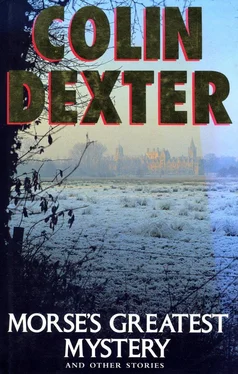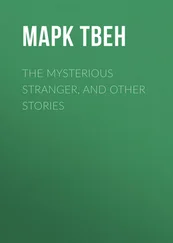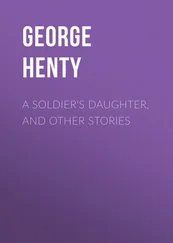He reached for the phone and rang Inspector Crawford to tell him of his eleventh-hour reprieve — soon learning from Sergeant Wilkins that Crawford had just been called in to see Strange. He’d pass the message on, though.
Confessions are good for the soul but bad for the reputation.
(Thomas Robert Dewar)
When, half an hour later, Crawford came in, Morse reached into a drawer for the envelope. But it was Crawford, looking preternaturally pleased with himself, who immediately seized the initiative.
“I was just going to call you . You’ll never guess what’s happened.”
“Watson’s unearthed his lost exhibits?”
“Better than that.”
“They’ve just appointed PC Watson Chief Constable?”
Crawford blurted it out: “Muldoon! He’s changed his plea — through his lawyer. He’s pleading guilty as charged on all counts. And he’s come clean on the Jericho and Botley places. Very interesting what he’s told us about them . Complete change of heart, that’s what he’s had, Muldoon — with the, er, encouragement of some, you know — one or two little privileges.”
“Well done!” said Morse, quietly slipping the envelope back into its drawer.
“And Strange ? He’s over the moon.”
“Everybody’ll be pleased.”
“Lucky though, wasn’t I?” said Crawford reflectively.
“We all deserve a little bit of luck now and then,” said Morse.
After Crawford had gone, Morse once more took the photographs from their envelope, and looked at them briefly again — especially at that neatly sliced left ear — before slowly tearing them up and dropping the pieces into his waste-paper basket.
Then he wrote out a cheque, and addressed an envelope to Manuel McSevich, Esquire, The Studio, High St., Abingdon, Oxon. It seemed to Morse a quite disproportionate sum to pay; yet, perhaps, not totally exorbitant — considering the nature of the entertainment which that most unusual of evenings had provided.
If children grew up according to early indications, we should have nothing but geniuses.
(Johann Wolfgang von Goethe)
Only very occasionally did Superintendent Strange patronize the canteen at HQ. But that lunchtime, as the solitary Morse sat at the corner table, his back to his colleagues, rather dejectedly sipping a bowl of luke-warm leek soup, he felt a hand on his shoulder.
“Can I join you?”
Morse nodded a supererogatory “yes,” as Strange unloaded from his tray a vast plateful of steak-and-kidney pie, two bread rolls, and a substantial wodge of treacle-tart covered — nay smothered — with custard.
“You heard about Muldoon, Morse?”
“Inspector Crawford told me the good news.”
Strange rubbed his hands gleefully. “Excellent, isn’t it? Excellent! Not the slightest suspicion of any undue police pressure either — you know that!”
“So I understand, sir.”
“Above suspicion, eh? Like Caesar’s wife.”
“Let’s hope so.”
“You couldn’t remember her name, could you?”
“No.”
“Crawford could, though.”
Morse nodded. Crawford was clearly the flavour of the month. So be it.
“You’re not eating much?” queried Strange, forking another great gobbet of meat into his mouth.
“I’m not very hungry today.”
“It’s a wonder you’re not in the pub, then. You’re usually thirsty enough.”
The reminder did little to lighten Morse’s mood; and in sycophantic fashion he quickly sought to change the drift of the conversation.
“How’s that little grandson of yours, sir?”
“Fine. Absolutely fine! Did I show you his latest photo?”
Morse nodded, hurriedly. “Still behaving himself?”
For a few seconds, Strange looked slightly uneasy — before leaning over the almost empty plate of treacle-tart, a mischievous glint in his eye.
“To tell you the truth, Morse, his mother rang us only last night. Seems she left him with a baby-sitter when she went to church for Easter-morning service. And d’you know what the little bugger did? He went and bit the bloody baby-sitter’s hand!”
“Just a temporary lapse,” suggested Morse.
“Course it was! We can’t be good all the time, can we? None of us can.”
Morse nodded slowly. “No, sir. We all have the occasional moment when we’re not — we’re not particularly proud of ourselves.”
Strange appeared gratified by this latter sentiment; and after spooning up his last mouthful of custard he sat back, replete and relaxed. Taking out his wallet, he extracted, just as he had done a week earlier, the latest snapshot of Grandson Number One (two years, three months).
“Super little chap, Morse. You can leave him with anybody — well, almost anybody! As good as gold, almost.”
As if with mutual understanding, the two policemen looked at each other then.
And smiled.
“Hallo!” growled Scrooge, in his accustomed voice as near as he could feign it. “What do you mean by coming here at this time of day?”
(Dickens, A Christmas Carol )
He had knocked diffidently at Morse’s North Oxford flat. Few had been invited into those book-lined, Wagner-haunted rooms: and even he — Sergeant Lewis — had never felt himself an over-welcome guest. Even at Christmas time. Not that it sounded much like the season of goodwill as Morse waved Lewis inside and concluded his ill-tempered conversation with the bank manager.
“Look! If I keep a couple of hundred in my current account, that’s my look-out. I’m not even asking for any interest on it. All I am asking is that you don’t stick these bloody bank charges on when I go — what? once, twice a year? — into the red. It’s not that I’m mean with money” — Lewis’s eyebrows ascended a centimeter — “but if you charge me again I want you to ring and tell me why !”
Morse banged down the receiver and sat silent.
“You don’t sound as if you’ve caught much of the Christmas spirit,” ventured Lewis.
“I don’t like Christmas — never have.”
“You staying in Oxford, sir?”
“I’m going to decorate.”
“What — decorate the Christmas cake?”
“Decorate the kitchen. I don’t like Christmas cake — never did.”
“You sound more like Scrooge every minute, sir.”
“And I shall read a Dickens novel. I always do over Christmas, Re -read, rather.”
“If I were just starting on Dickens, which one—?”
“I’d put Bleak House first, Little Dorrit second—”
The phone rang and Morse’s secretary at HQ informed him that he’d won a £50 gift-token in the Police Charity Raffle, and this time Morse cradled the receiver with considerably better grace.
“ ‘Scrooge,’ did you say, Lewis? I’ll have you know I bought five tickets — a quid apiece! — in that Charity Raffle.”
“I bought five tickets myself, sir.”
Morse smiled complacently. “Let’s be more charitable, Lewis! It’s supporting these causes that’s important, not winning.”
“I’ll be in the car, sir,” said Lewis quietly. In truth, he was beginning to feel irritated. Morse’s irascibility he could stomach; but he couldn’t stick hearing much more about Morse’s selfless generosity!
Morse’s old Jaguar was in dock again (“Too mean to buy a new one!” his colleagues claimed) and it was Lewis’s job that day to ferry the chief inspector around; doubtless, too (if things went to form) to treat him to the odd pint or two. Which indeed appeared a fair probability, since Morse had so managed things on that Tuesday morning that their arrival at the George would coincide with opening time. As they drove out past the railway station, Lewis told Morse what he’d managed to discover about the previous day’s events...
Читать дальше












